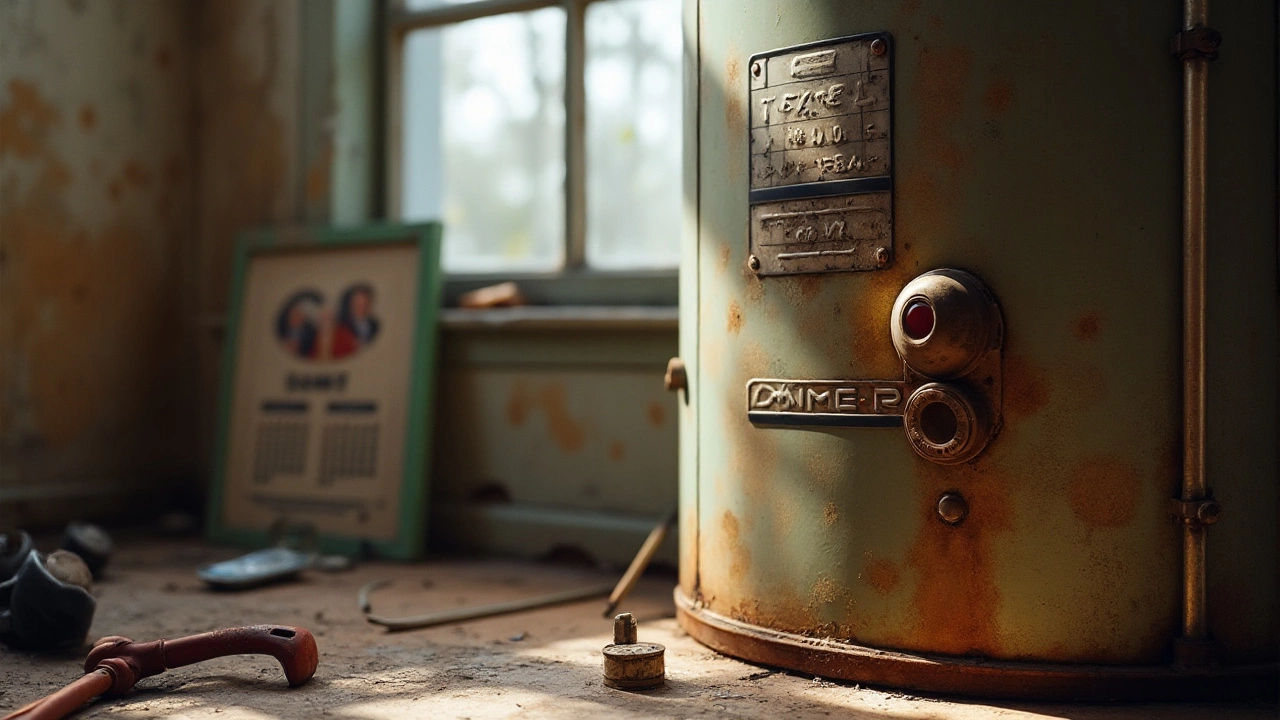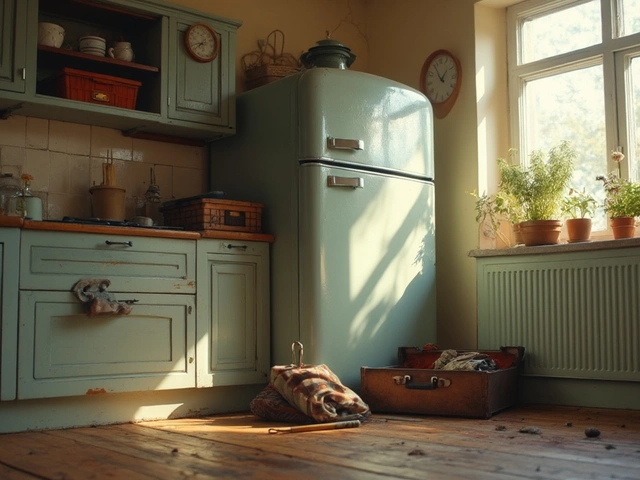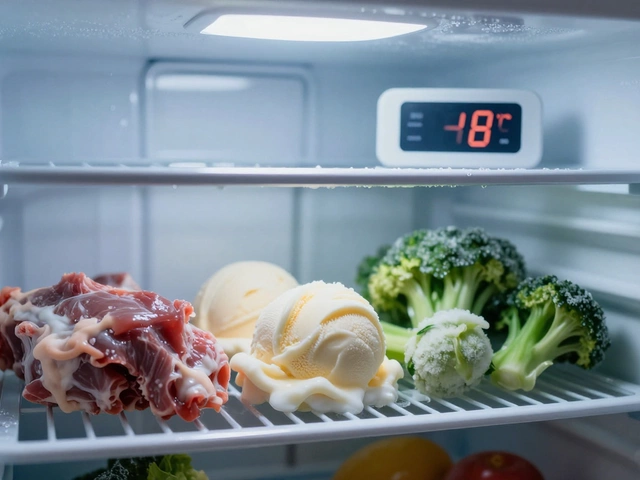When faced with a water heater that's been humming along for two decades, it's normal to wonder if it's worth saving. We hear stories of trusty tanks surviving the long haul, but reliability takes a backseat when inefficiency looms. The decision whether to repair an aging unit or invest in a new one involves more than just the immediate fix.
It's a balance of costs, safety, and energy savings. One must consider how the heater stacks up against modern equivalents in terms of energy consumption and safety features. After all, a household appliance of this vintage might show its age in more ways than one. Let's explore whether holding onto that heater is wise or if it's time to welcome a newer, more efficient model.
- Understanding the Lifespan of a Water Heater
- Signs Your Water Heater Needs Attention
- Weighing Repair vs. Replacement Costs
- Energy Efficiency Considerations
- Safety Concerns and Modern Features
- Expert Tips and Maintenance Advice
Understanding the Lifespan of a Water Heater
Upon venturing into an age-old question about the longevity of water heaters, one must consider various factors that contribute to their lifespan. It's something homeowners often overlook, yet understanding what makes these units tick can save stress down the road. A standard water heater is built to last about 8 to 12 years. This range, of course, depends on a multitude of elements such as the type of water heater, quality of water supply, and maintenance routines. Remarkably, units that receive diligent care sometimes far exceed expectations, running smoothly into their teens or even twenties.
Types of water heaters play a significant role in determining lifespan. For instance, traditional tank-style heaters typically last around 8 to 12 years, whereas tankless or on-demand water heaters can function for more than 20 years given the right conditions. The state of the incoming water supply also critically impacts longevity; hard water, filled with minerals, tends to shorten the life of the appliance due to sediment buildup. This buildup not only affects efficiency but also prompts corrosion, reducing operational integrity.
Regular maintenance plays an equally important role in extending a water heater's life. Tasks such as flushing out the tank annually, inspecting the anode rod, and checking the pressure relief valve are pivotal. These routines help curb further detriments like sediment accumulation and corrosion. Experts often emphasize this routine; as quoted by renowned plumbing specialist Gary Klein,
"Regular maintenance is the unsung hero that can transform a water heater from a frail friend to a steadfast companion."This suggests the influence regular care can have on elongating effective service.
Moreover, environmental factors, such as water quality and usage patterns, directly affect how long a heater can last. A household with a high demand for hot water might witness more wear and tear over time. In contrast, a smaller family with lower usage patterns may find their unit lasts longer. Interestingly, some owners find that their perfectly maintained water heaters continue to provide hot water well past the expected expiry, challenging the standard industry expectations about heater durability.
A particularly telling piece of statistical information can be quite insightful here. Consider a survey that once noted that only about 27% of homeowners actually follow recommended maintenance practices regularly. This data strongly supports why so many water heaters fail to reach their potential lifespan. Indeed, proper maintenance and timely repairs can transform expectations dramatically.
Signs Your Water Heater Needs Attention
It might surprise you how many households ignore subtle indications of a tired water heater. Often downplayed as issues stemming from blissful ignorance or merely procrastination, these signs can be quite telling. It starts with the more noticeable signs like inconsistent water temperature – we've all hovered our hands tentatively under faucets, anticipating either an Arctic rush or a scalding surprise. This erratic behavior isn't normal for a healthy heater and certainly shouts for attention.
Another red flag is the strange noises erupting from the heater's casing – it's like your trusty old appliance has joined a rock band without informing you. These sounds, whether rumbling like distant thunder or resembling the pop of corn kernels, usually hint at sediment buildup. Over two decades, particulates settle at the bottom, demanding a decluttering session. If only it could Marie Kondo itself and spark joy!
Check your utility bills for any unexpected spikes as well. An aging unit losing its grip on efficiency can ramp up energy use before you even notice. If last month's bill was higher than usual, and the winter chill isn't to blame, it might be time to don your detective cap and investigate. Even the smallest changes in daily usage habits could push an ailing unit to demand more electricity or gas than it's worth.
Water discoloration is another potential road sign to disaster, pointing toward tank corrosion. While it might seem innocuous, murky water may not just be an aesthetic issue. Corrosion and rusty water could affect your home's plumbing infrastructure, creeping into areas where the damage can amplify. If you notice this, it might be time to consider more than just a quick fix.
Some water heater models come with a pilot light, and seeing it flicker incessantly, like a candle struggling against the wind, probably means the unit is working harder than it should. Whether it’s a gas heater contesting with drafts or poor ventilation, flickering lights are a cry for help. Do you want peace of mind? Consider frequent light extinguishing as a reason to seek professional help.
Often, early signs might not seem urgent, but let's heed the advice of the Home Improvement Institute: "
The key to longevity and efficiency lies in addressing issues promptly. Delaying maintenance might save a little now, but can exponentially increase overall costs."Don't let small issues escalate into a full-blown cascade of repairs, or worse, an untimely replacement of not just the heater, but affected areas around it as well. These signs, when spotted early, could offer more than savings – they could provide safety and, ultimately, domestic peace.

Weighing Repair vs. Replacement Costs
Deciding whether to repair or replace a 20-year-old water heater is like walking a tightrope between being economical and embracing modern efficiency. Calculation starts with assessing the cost of repairs. Typically, repairing an older model can run from minor expenses for parts and labor to hefty bills when dealing with significant issues like tank leaks or failing heating elements. At this stage, it's crucial to ask if these repairs will genuinely extend the life of this resilient water warrior or merely patch it temporarily.
In contrast, investing in a new unit might seem daunting with upfront costs ranging from $500 to over $1,500, depending on the model and quality. However, today's heaters come with improved energy efficiency, potentially lowering electricity or gas bills substantially. According to the Department of Energy, water heating accounts for approximately 18% of a home's total energy usage. Upgrading to a new, more efficient model can save a homeowner between 7-15% on water heating costs alone. These savings quickly add up and can, over time, offset the initial investment of a new heater.
Another critical point in the decision-making process is considering modern features that enhance convenience and safety. Newer models boast digital displays, smart technology integrations, and improved safety standards, all designed to make life a little easier and safer. Repairs on ancient models might not offer the same peace of mind or operational efficiency. This is where water heater repair becomes less about the immediate solution and more about a comprehensive evaluation of future benefits.
"When repair costs are approaching 50% of the cost of a new unit, choosing replacement often makes more sense," says Michael Hodgson, a well-regarded home energy expert from Green Building Advisors. His advice points to long-term gains over short-term fixes.
Additionally, there is a longevity factor to weigh in—while you may nurse a 20-year-old model back to nominal health with repairs, such efforts could be akin to rolling a boulder uphill. The expected lifespan of a standard water heater is typically 10-15 years, so going beyond that takes you into uncertain waters where reliability is no longer a given.
Financially, it's wise to sit down with a calculator and go over these variables. Consider the potential repair costs against the fixed cost of new installation. Balance this with energy savings estimates and any available warranties that come with new models, which often span several years, offering a measure of protection against future expenses. Also, contemplate any possible rebates or incentives for energy-efficient appliances, which can help soften the financial impact of a new purchase.
If you're particularly attached to your current heater, perhaps due to its sheer stubbornness to quit over the years, only continued, regular maintenance can assure it defies the odds. However, recognizing when you're throwing good money after bad is essential—after all, a water heater overhaul is far less stressful and inconvenient to plan than an emergency replacement in the dead of winter.
Energy Efficiency Considerations
It's no secret that technology advances at a pace that's hard to keep up with, and water heaters are no exception. A 20-year-old water heater might still serve its purpose in warming up your morning shower, but at what cost? Older models tend to be significantly less efficient than newer ones, with energy efficiency standards continuing to evolve. The electricity or gas they're guzzling could translate to higher utility bills that sneak up on you month after month. Every year, the U.S. Department of Energy releases updated guidelines for appliances, pushing them toward more energy-efficient designs. For water heaters, this means optimized designs that hold heat better and lose less energy to the surroundings.
Modern water heaters, including heat pump models and on-demand tankless versions, have efficiency levels that would have seemed impossible two decades ago. A high-efficiency unit today can save you as much as 20-30% on your energy bills compared to your old standard tank heater. Picture this: while your vintage heater might operate at around 60% efficiency, current models boast efficiencies approaching 90%. This means less wasted energy and more savings with every hot faucet turned on. Investing in a new heater might seem pricey upfront, but those savings quickly add up over time.
An interesting metric to consider is the Energy Factor (EF) rating, which provides a standardized measurement of a heater's efficiency. Older water heaters typically hover around an EF of 0.6 to 0.7. In contrast, newer models often achieve an EF of 0.8 or higher. Such a difference may not seem huge at first glance, but over the lifespan of a heater, it's substantial. "The cost of maintaining an old water heater versus the efficiency gains of a new unit is a calculus every homeowner should consider," suggests an analyst from the American Council for an Energy-Efficient Economy.
Let's not forget the environmental impact. A newer, energy-efficient unit not only takes a load off your wallet but also reduces your household's carbon footprint. Given the increasing emphasis on sustainability, replacing an old heater might be a step toward a greener home. Donating or recycling the parts of your old heater can also contribute to an environmental cause. When evaluating your decision, think about the long-term benefits rather than just immediate costs. Making the switch could align with your values, contribute to broader environmental efforts, and keep your home in the energy-efficient age.

Safety Concerns and Modern Features
The journey of a 20-year-old water heater often comes hand in hand with a host of potential safety concerns. Aging components may start to fail, leading to leaks or worse, the dreaded tank burst. Such possibilities underscore the importance of evaluating the safety aspects of keeping an old water heater in service. Corrosion is a common ailment for tanks this age, weakening the structure and increasing the risk of catastrophic failure. Regular inspections reveal rusty water, strange noises, or lukewarm showers which are telltale signs your heater might be on its last legs. On top of all this, overheating issues can begin to emerge, sometimes causing the pressure relief valve to malfunction, increasing chances of elevated pressure and potentially dangerous outcomes. Therefore, it's crucial to weigh these safety risks against the benefits of opting for newer models with modern safety features that diminish such hazards.
Modern water heaters have come a long way, and they boast numerous features that contribute not just to safer operation but also improved efficiency. New designs often incorporate advanced sensors and automatic shut-off systems to prevent overheating and excessive pressure build-up. They also tend to have sturdier construction materials that mitigate risks of leaks and reduce the corrosion rate significantly. In addition, contemporary water heaters are equipped with user-friendly interfaces and smart technology that allow homeowners to monitor energy usage and adjust settings remotely, making maintenance a breeze.
"With the technology available today, modern water heaters are about 20% more efficient than older models, offering substantial savings on utility bills," notes Sarah Jennings, a renowned plumbing expert.Such innovations provide peace of mind knowing the unit is not only safer but also contributes to household energy efficiency. Investing in a new model also presents an opportunity to align with greener and more sustainable options, boosting eco-friendly credentials and reducing carbon footprints substantially. When considering a modern upgrade, the blend of enhanced safety features and technological advancements offers more compelling arguments than ever before.
Expert Tips and Maintenance Advice
When you own a 20-year-old water heater, it's crucial to follow expert tips for maintenance to ensure it continues to function efficiently. One of the best defenses against unexpected breakdowns is keeping your water heater in good condition. Regular check-ups not only extend the life of the appliance but also improve its efficiency drastically. It's advised to inspect and flush the tank at least once a year. This process helps remove sediment build-up, which can lead to blockages or worse, corrosion, compromising the heater’s internal parts. Regular flushing is particularly essential for homes that receive hard water, as the mineral deposits can be quite aggressive.
Monitoring the condition of the anode rod is another critical step. The anode rod protects the tank from rust and corrosion, and generally speaking, if the rod is more than 50% worn down, it’s time for a replacement. Experts recommend checking it every two years and replacing it around every four years or so, depending on your water chemistry and usage patterns.
As explained by John Smith, a seasoned plumber, "An anode rod is like a vaccination for your water heater. Ignore it, and you risk the appliance rapidly deteriorating beyond repair."Paying attention to the temperature settings is also valuable; most recommendations suggest keeping it between 120 to 140 degrees Fahrenheit to prevent scalding and reduce energy costs.
If the heater showcases signs of inefficiency or minor leaks, it’s prudent to address them promptly. Even small leaks can lead to more significant underlining issues if not fixed timely; thus, they should never be overlooked. Seals and gaskets around inlets and outlets should be inspected regularly for any signs of wear. A well-maintained water heater can often outperform a neglected newer model in terms of efficiency. To avoid surprises, professionals also recommend replacing key parts, such as thermostats or heating elements, every three to five years to maintain optimal functionality.
Experts say keeping your water heater free from clutter is often overlooked but vital maintenance tip - ensuring at least two feet of clearance around the tank can improve air circulation and heat management. Whether you decide to eventually repair or replace, understanding these maintenance practices enhances the appliance’s lifetime, offering the peace of mind that comes with a reliable heating system. These efforts show how a little care can go a long way, creating a lasting difference in terms of long-term savings and operational wellness.





